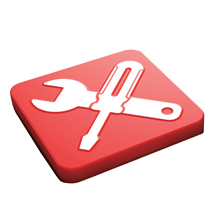
Writer’s Toolbox
Taking apart a broken laptop, learning how to repair it and putting it back together is a typical exercise in one University of Maine English class. For students in the technical editing and document design course, learning how to diagnose and repair electronics is essential to writing about the process in the form of easy-to-use consumer guides.
Since 2011, students in Charlsye Diaz’s class have been required to create an e-manual for iFixit, a website that offers free step-by-step guides to help consumers repair devices to keep more electronics in use and out of landfills. During the fall 2014 semester, Diaz’s students will write manuals for toys.
“This experience is important because it is messy,” says Diaz, an associate professor of English and coordinator of UMaine’s professional and technical writing program. “When things ‘fall apart’ or the projects don’t go as well as I would like, I love it. Because they’ll face those obstacles on the job every day.”
Students work with iFixit’s technical writers to adhere to the company’s guidelines. They receive feedback from someone besides the professor while working in a supportive classroom setting.
IFixit was started in 2003 by two Cal Poly, San Luis Obispo students who struggled to fix an iBook without instructions. In 2009, the company started the iFixit Technical Writing Program as a way to engage students with a hands-on, repair-focused technical writing project. Students from 20 universities — including UMaine — have created 5,000 repair guides for electronics, which have helped more than nine million people fix their devices, according to the company’s website.
Diaz says the project also benefits potential employers by sending students into the workforce with real-world experience.
“It’s one thing to go to an interview and claim to be able to write instructions because you practiced during a class assignment. It’s another thing to say you took apart a scanner and wrote instructions for replacing the scanner lamp and then provide a link to a published guide that people use,” Diaz says.
KC Collins Cook, a 2013 UMaine graduate who earned a bachelor’s degree in English with a concentration in professional and technical writing, is now an information developer for IBM in North Carolina. She says every day she applies the knowledge she learned from Diaz’s classes.
“My core understanding of technical documentation began in her classrooms, and it gave me a foundation to build on and innovate with my fellow IBMers,” Cook says. “From grammar to design software to how people read; it’s all vital to my job. In fact, all of my textbooks are in my desk for reference when I need them.”
Although many of Diaz’s students find aspects of the iFixit project challenging — learning how to take apart small devices, take photos without shadows and follow iFixit’s criteria — most are proud of the end result, she says.
“Some students embrace the project and really thrive working with and writing about small electronics. Others dislike it because the project falls outside their comfort zone,” Diaz says. “Who needs a toolbox for a writing class?”
The positive feedback comes later, Diaz says. Students have told her they’ve talked about their experience during interviews and appreciate having a professional portfolio piece.
“During the project, I see their confidence skyrocket,” she says.
An education in professional and technical writing is important, Diaz says, because almost everyone has to write at work in the form of reports, memos or emails. Professional writers take these skills a step further and learn to design documents, write for the Internet and edit — skills Maine employers seek, she says.
Professional writing is offered as a minor to any UMaine student, and English majors can concentrate in professional and technical writing. Diaz says graduates work in several areas including technology, marketing, health care, research and development, government, law, magazines and museums. She says most students find work within six months of graduation, and most have jobs before they graduate.
Since Cook began her full-time job in September 2012, she has seen IBM hire two more professional and technical writing students from UMaine.
“If you go in with a thirst to work, your resume and experience will be soundly rewarded,” Cook says. “We leave campus with a competitive skill set that sets us apart from other new college graduates in our field.”
More information about iFixit and the iFixit Technical Writing Program is online.
